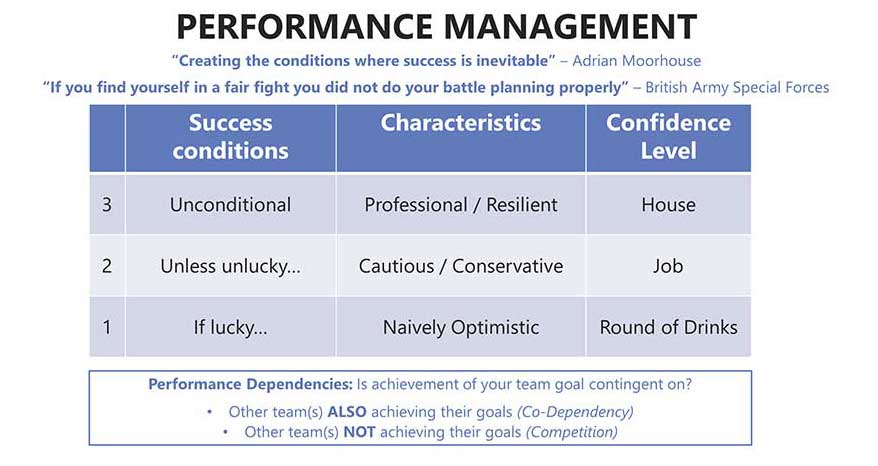Team-based simulations can be an excellent medium for giving managers and leaders hands-on experience of Performance Management.
A key element of all our simulation-based learning process is a Team Planning Phase where the teams playing the simulation are given time to organise themselves for success. As part of this planning we encourage them to assess their confidence levels before they start, throughout the simulation and after they finish

For example, were they overly optimistic at the start but were able to make some mid-course corrections to enable them to successfully deliver in the end?
The diagram above summarizes a simple but very practical model of Performance Management teams can use the assess Confidence Levels in their expected Performance.
LEVEL 1: Naively Optimistic
We call the lowest level of Performance Management “Naively Optimistic” which means that the team will only succeed IF it gets lucky. For example, if a sales team need 3 sales, but only have 6 prospects and their win rate is 33% then they will only succeed if they get lucky. If the team was asked how much they would bet on them being successful they would probably not stretch beyond buying a round of drinks at the local pub. This is very weak form of performance management as it offers no consistency.
LEVEL 2: Cautious / Conservative
The next level we call “Cautious / Conservative” which means that the team will succeed UNLESS they are unlucky. For example, if a sales team need 3 sales, but have 12 prospects and their win rate is 33% then they will only fail if they are unlucky. This is stronger performance management than the lower level – teams should succeed most of the time but they will still frequently fail. If the team was asked how much they would bet on them being successful you might manage to get them to say they would bet their jobs on it but that would be somewhat rash!
LEVEL 3: Professional / Resilient
The highest level of Performance Management in our simple model is “Professional / Resilient” which means that a team has risk assessed the things which could go wrong and built resilience into their plans to reduce and mitigate the impact on their performance. Note this is not an absolute guarantee that they will always succeed – nobody can promise that. An airline pilot cannot guarantee their plane will never crash but they will bet their lives on this not happening. This is the level of performance which organizational teams should be aiming for as it offers a consistence of result which their leaders and colleagues can rely on (even betting their houses on) when they make their other important plans and investments!
Must someone else win or lose for you to win?
One of the important issues to consider in Performance Management is determining whether achievement of your team objectives is contingent on:
a) Some other team or business ALSO achieving their objectives (Co-Dependency)
b) Some other team or business NOT achieving their objectives (Competition)
In a Co-Dependency scenario, you may also need to monitor and help the other team or teams. In a Competition scenario, you need to decide whether you really must be in direct competition with another team to achieve your objectives? This emphasizes the importance of goal setting which drive all team behaviours. For example, instead of the goal of have the highest profits of all teams (directly competitive) you might consider instead the goal of your profits > x (indirectly-competitive)?
Conclusions
Business Simulations can be a great vehicle for managers and leaders to learn about the discipline of Performance Management in a practical way in a safe but challenging environment.